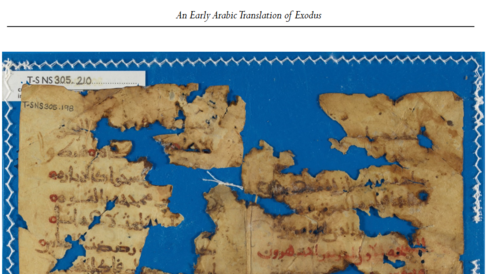
The Cairo Genizah preserved documents spanning more than 1000 years of Jewish history. But its contents represent considerably more.
In a new open-access study, Dr Nick Posegay reports on the survival of fragments from a Christian Arabic Psalter. This psalter manuscript, Posegay argues, was produced in the late 9th or early 10th century CE, making it one of the earliest Arabic Bible translations and placing it among the oldest manuscripts in the Cairo Genizah collections.
In the new Collectanea Christiana Orientalia article, Posegay documents similarities between the psalter and ancient Arabic Bibles preserved at St. Catherine’s Monastery in the Sinai Peninsula. Presenting this research required mastery of Syriac typesetting, while further exercising Posegay’s knowledge of Greek. The Psalter itself, he argues, was likely the product of a Melkite Christian who spoke both Syriac and Arabic.
The article emerges from Dr Posegay’s ongoing Leverhulme project, Interfaith Exchange in the Intellectual History of Middle Eastern Languages. It follows on from his previous studies of Judaeo-Arabic Bibles and Islamic manuscripts in the Cairo Genizah Collections, and extends scholars’ understanding of the Christian documents preserved by the Fustat Jewish community.
In addition to being a member of the Cambridge Interfaith Research Forum, Dr Posegay is an Affiliated Researcher at Cambridge University Library’s Genizah Research Unit. He identified this psalter manuscript in the course of his work there.
The presence of Christian and Muslim manuscripts in the Cairo Genizah shows that the Jews of medieval Egypt had access to non-Jewish books and were well versed in the Arabic literary culture of their day. Access Nick’s article, An early Arabic translation of Exodus 15, free via journals.uco.es (doi.org/10.21071/cco.v21i.16681).
Also out this week
Jacob Lypp (LSE) and Esra Özyürek have a new article out in the journal Men and Masculinities—“Taming Muslim Masculinity: Patriarchy and Christianity in German Immigrant Integration” analyses state-funded pedagogies that present men as suffering from a psychopathology rooted in Islamic “honor culture”.
The study highlights three implications: a perpetuation of Orientalist hierarchizations of Muslim masculinity; the alternative construct of heteronormative patriarchy as benevolent; and a blurring of religious lines as reform of Muslim masculinity entails a “dramatic conversion” to Christian-German culture.
Read Jacob & Esra’s article in full via journals.sagepub.com (doi/10.1177/1097184X241256606).
